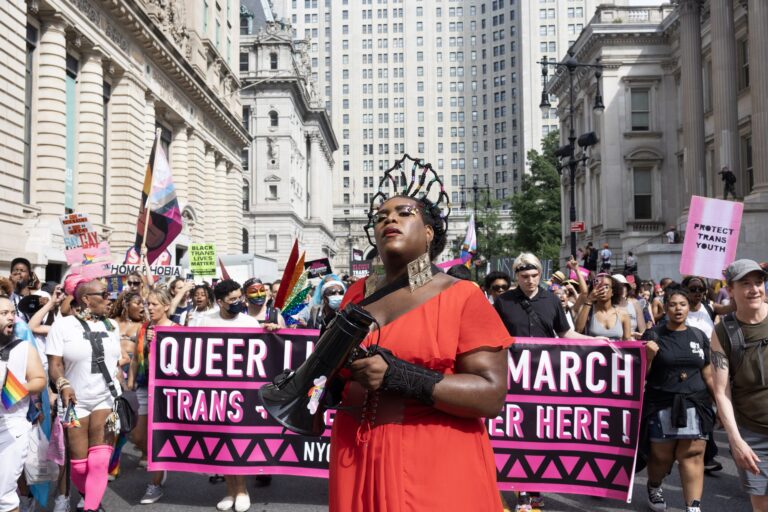welcome Everything is politicalCapital B’s weekly news, culture and politics newsletter!
In this issue, we learn about the sadness that looms over Pride, U.S. Supreme Court Justice Clarence Thomas’ surprising concurring opinion in a recent case, the push to make “Black Wall Street” a national monument, and former President Donald Trump’s historic criminal trial.
Now, let’s get on with the show.
A not-so-fun Pride season
Pride Month is just around the corner, one of my favorite times of the year and a joyous time of queer bonding.
But this year, sadness and anger are winning.
Tay Dior Thomas, Kita Bee, Starr Brown. These are some of the names of Black transgender women who have been murdered in the past few weeks alone. On Tuesday, the trial of a man accused of shooting and killing Regina “Mya” Allen, a Black transgender woman, began in a Milwaukee County courtroom in 2022.
As the United States prepares for a crucial election, these deaths are a harsh reminder of not only the roots of queer American pride in seeking social and political equality, but also the heightened danger the community has faced in recent years, as state lawmakers have introduced a record number of anti-LGBTQ bills in 2023, primarily targeting education and access to gender-affirming health care.
“Our transgender communities of color continue to bear the brunt of anti-LGBTQ+ violence and policies,” Tori Cooper, community engagement director for the Human Rights Campaign’s Transgender Justice Initiative, said after Bea’s death, which remains under investigation. “Like all transgender people, Kita deserved to live a long and fulfilling life in a safe and affirming environment.”
Clarence Thomas’s chilling agreement
A week later, I’m still thinking about the blow that the U.S. Supreme Court’s decision to hold that congressional districts are not racially discriminatory has dealt black South Carolinians.
In particular, I cannot get my mind off Justice Clarence Thomas’ concurring opinion.
As if the Supreme Court’s rulings weren’t precarious enough, Thomas also argues that federal courts should be barred from reviewing allegedly racist maps, which he believes is purely the business of politicians. Thomas also blasted Brown v. Board of Education, arguing that the Supreme Court persisted in “overuse of judicial power” to fight Jim Crow segregation exactly 70 years ago.
Simply put, Thomas is arguing for the eradication of legal precedents that have allowed black Americans to chip away at racial inequality.
Thomas’ opinion may seem outlandish, but it would be wise to remember that a dissenting or concurring opinion could become a majority opinion in the future. Indeed, the South Carolina case illustrates this possibility. As Justice Elena Kagan points out, Justice Samuel Alito’s majority opinion that made racially discriminatory gerrymandering unsound was his dissenting opinion in Cooper v. Harris in 2017.
Tulsa and the Battle for Historic Preservation
Friday marks 103 years since a white mob laid siege to the Greenwood neighborhood of Tulsa, Oklahoma, killing as many as 300 people and leaving thousands more homeless.
To confront this history and pay tribute to the vanished black community, descendants of survivors of the Tulsa Race Massacre traveled to Capitol Hill this month to urge passage of a bill to designate Greenwood as a national monument.
The bill has bipartisan support in the Senate, and a companion bill is expected to be introduced in the House of Representatives later this year.
“I’m not just excited, I’m super excited,” Tiffany Crutcher, whose great-grandmother narrowly escaped the Tulsa attack, told me. “If this monument designation is approved, we will be giving voice to the survivors who are no longer with us, as well as the ancestors who built Greenwood.”
You can read my story about the fight to make Greenwood, known as “Black Wall Street,” a protected landmark here.
Trump and Accountability
Closing arguments concluded this week in former President Donald Trump’s historic hush money trial, in which he has denied having an affair with adult film star Stormy Daniels and has also pleaded not guilty to 34 felony counts of falsifying business records.
As Marcia Chatelain, a professor of African studies at the University of Pennsylvania, told me last year, Trump is reminding people that “if you’re white and you have money,” you get to play by different rules.
Now the country waits to see if he will become the first former president to be convicted of a crime.
Please continue to check this page for the latest updates.
In the meantime, I invite you to read this recent piece written by my Capital B Atlanta colleague Chauncey Alcorn about Fulton County District Attorney Fani Willis, who won the Democratic primary earlier this month and filed a fraud case against Trump.
Rethinking Pride Stonewall Leader,
Brandon Tensley
Source link

